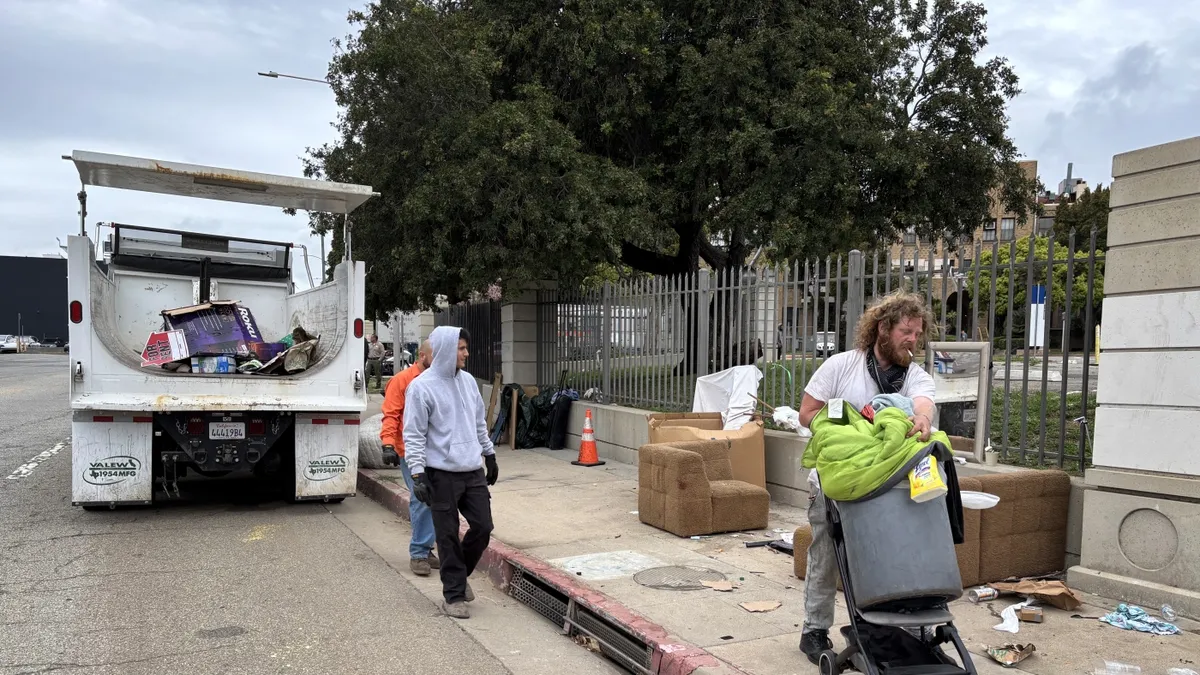
On a cool weekday morning last month, just steps away from California's upscale boutiques and bistros, Irving Webb, an Iraq war veteran, found himself in a desperate situation. As sanitation workers cleared the sidewalk he had been calling home for several nights, Webb struggled to break camp, sweating profusely through his white T-shirt as he loaded his belongings into a shopping cart. "I've been here for five years," he lamented, "and they're freaking killing me. This is like the fifth time in the last month." His makeshift home was situated just outside the gates of the VA's extensive West LA campus.
Surprisingly, Los Angeles boasts the highest number of homeless veterans in the United States, despite having a vast, 388-acre Veterans Affairs campus that was established in 1888 as a home for soldiers. Over recent decades, however, this land has been marred by questionable leases, including athletic fields for the private Brentwood School and UCLA's baseball stadium. Legal challenges have compelled the VA to initiate the construction of housing, but progress has been painfully slow.
Political pressures led to the establishment of a temporary shelter resembling a refugee camp within the parking lot of the campus. When these tiny homes reach full capacity, overflow beds are allocated as they become available. "I used to do that all the time. It doesn't work for me. This is what works for me," Webb explained, even as his camp was dismantled and loaded into a garbage truck. Fellow Iraq veteran and advocate Rob Reynolds highlighted the dire situation: "You'll have veterans that show up in the evening, and there's not enough room. There's nowhere for them to go." He emphasized that the most vulnerable veterans are often the hardest to assist.
Reynolds pointed out that if the VA had acted more swiftly in constructing housing on the property, there would be greater options available for veterans from various eras, especially those grappling with mental health issues or substance abuse. "Housing on this property is very important for some people that have severe disabilities because they can be right next to the hospital, where they receive their mental health care," he stated.
Recent developments have ignited new hope among advocates. An executive order from the White House on May 9 has proposed transforming the VA campus in West Los Angeles into the National Center for Warrior Independence. This initiative aims to provide facilities and resources to help veterans regain their self-sufficiency. The order directs the VA secretary to devise a plan within 60 days to accommodate 6,000 veterans on the campus by 2028.
However, the order has raised eyebrows, particularly because it was issued without prior consultation with Los Angeles VA officials, according to several current and former government employees who spoke anonymously to NPR. VA spokesman Pete Kasperowicz has stated that more details will emerge but has not addressed specific inquiries. One concerning detail is that the number 6,000 represents roughly double the current homeless veteran population in LA, leading to speculation that the administration may intend to house veterans from across the nation at this campus.
In the past, VA officials have voiced opposition to clustering so many troubled veterans in one location, fearing it could create a marginalized community. Congressman Brad Sherman, who represents West LA, expressed skepticism about the seriousness of the order, noting the lack of specifics. He remarked that the funding for construction might come from resources that could have supported housing or services for undocumented immigrants, suggesting that the announcement might be more of a political statement than a concrete plan.
Many of the delays in construction on the VA campus stem from legal issues regarding the VA's involvement in housing. Advocates in Los Angeles have worked tirelessly, raising funds through public-private partnerships, a process that has taken years to develop. Sherman expressed hope that the Trump administration would indeed commit to funding more construction, potentially providing as much as $3.3 billion to create 6,000 housing units.
Reynolds, the Iraq veteran and advocate, welcomed the news of the executive order, stating, "The executive order is the morally correct thing to do. There's no reason that we should have thousands of veterans sleeping on the streets of Los Angeles when we have nearly 400 acres of land that was donated to house them." He expressed gratitude for President Trump's stance.
As advocates in LA await further details, they envision a comprehensive plan for the campus that extends beyond merely providing shelter. They dream of creating a vibrant neighborhood that includes long-term housing, essential services, parks, stores, and convenient access to public transport. "We don't care who takes credit as long as it's done properly," affirmed Steve Peck from the West LA Veterans Collective.